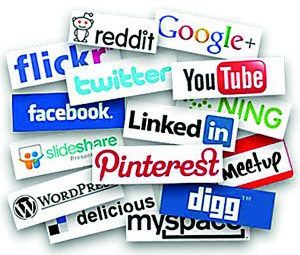Social Media & the MBA – Will the bubble burst? Ask the Expert
View(s):Social networking sites – they’re the latest craze to hit the internet, but just how long will it take until the bubble bursts? After all, many employers have already banned Facebook during the hours of 9am-5pm and surely we want our politicians to work on policies rather than updating us with tweets?
According to some experts, Facebook, MySpace, LinkedIn and Twitter are all here to stay. What’s more, there are new sites on the horizon and the list of social media platforms seems to be expanding by the day. “It’s now clear that social media groups are a reality on the web and have a real impact on day to day life,” For many MBA candidates the deluge of messages, posts, tweets and pins, in addition to everyday emails could be somewhat overwhelming. But as that old saying goes “if you can’t beat them, join them!”
on the web and have a real impact on day to day life,” For many MBA candidates the deluge of messages, posts, tweets and pins, in addition to everyday emails could be somewhat overwhelming. But as that old saying goes “if you can’t beat them, join them!”
Facebook, LinkedIn and Twitter
On its homepage, Facebook states its mission: to give people the power to share and make the world more open and connected. So far, more than 250 million people are uploading photos, posting messages, joining groups and finding friends through the power of Facebook. According to statistics on the site’s Press Room, more than 120 million users log on to Facebook at least once a day; the average user has 120 friends on the site; more than five billion minutes are spent on Facebook each day worldwide; about 70% of users are outside of the US; and the fastest growing demographic is those aged 35 or older – that’s a similar demographic to the MBA classroom, breaking the myth that Facebook is the exclusive realm of the iGeneration.
The more professional of the social networking sites is LinkedIn. Head to its homepage and LinkedIn will tell you it is an interconnected network of experienced professionals from around the world, representing 170 industries and 200 countries. You can find, be introduced to, and collaborate with qualified professionals that you need to work with to accomplish your goals. In the education sense, it is particularly useful for building a relationship with admin officers, course tutors or alumni to get tips on student life as well as how to get through the dreaded interview stage.
Then there is Twitter, the social networking site favoured by Barack Obama, Stephen Fry and Demi Moore. Twitter identifies itself as a service for friends, family, and co–workers to communicate and stay connected through the exchange of quick frequent answers to one simple question: What are you doing? But if you already text, instant message, email, or call people, why do you need to tweet as well? Twitter answers that question: because even basic updates are meaningful to family members, friends, or colleagues—especially when they are timely:
- Eating soup? Research shows that mums want to know
- Running late to a meeting? Your co–workers might find that useful
- Partying? Your friends may want to join you
Social media and corporates
However, the lines are becoming increasingly blurred as more and more corporates and companies turn to the social networking site tool. Dhanushka who is also considered as one of the country’s most renowned business strategist, has experienced a change in marketing practices over the last 12 months with the advent of sites such as Facebook, LinkedIn and Twitter.
 “Social networking is just that – social. No matter how influential an organization is, boring B2B campaigns won’t work here, users don’t have the time for them. As a result, companies have had to innovate and converse with users as a user themselves. This has led to many branding headaches as conventional corporate identity had to be thrown out to allow for personal, candid representation.”
“Social networking is just that – social. No matter how influential an organization is, boring B2B campaigns won’t work here, users don’t have the time for them. As a result, companies have had to innovate and converse with users as a user themselves. This has led to many branding headaches as conventional corporate identity had to be thrown out to allow for personal, candid representation.”
Dhanushka says the risk companies have taken has paid dividends to those that have done it properly, although it has come at a cost to the industry. “It almost single-handedly ended the market research industry. Why employ consultants to lead a consumer group of 20 when you can talk directly to 20 million? If you want proof, Cadbury’s hadn’t even considered bringing back a favoured chocolate bar, Wispa, until over 20,000 UK Facebook users joined a group demanding its return.”
Social media and the MBA
So how does the MBA candidate utilise these social networking sites? “Candidates can use social groups to meet alumni and understand and MBA approaches and philosophies,” Dhanushka says. “They can also analyse the activity and involvement of the alumni association and school messages, for example.”
Candidates can also evaluate the effectiveness of networking or job opportunities that are critical in influencing the choice of prospective MBA participants. After all powerful networking is part of what gives the degree its edge. Dhanushka also goes on to say for the entrepreneurial MBA candidate, they must use social networking sites as a showroom, an aggregator that can bring potential partners without spending too much time on a day to day basis.
“Remember, it’s real people, real business and it’s exploring today’s best advantages of our generation – the world has never been offering that much openness since its creation,” he says.
Will the social media bubble burst?
“No it won’t,” says Dhanushka, who is one of the most respected post graduate business consultants. “Some sites will suffer but the basic principles will remain. As long as it invites people to stay active contributors, the strength of these will be real. To me, Facebook has a long great story ahead of it – as long as they succeed in staying in line with people’s expectations and values.”
Dhanushka feels, “Social media is a new way of life for millions of human beings. It is a social answer to family spirit and the material world. The concept will stay even if new platforms may take market share.” It is these new platforms that users, and observers, should watch, says Dhanushka. “The bubble won’t burst, but it will change substantially. There is such a growing number of networks that people are starting to get lost within the rubble – sooner or later a one-for-all sign-in will be developed (Facebook have tried it with Facebook Connect – but the jury’s still out).
Once this happens, networks will lose identity and there will no longer be a distinction between different URLs. By this I mean there are so many websites that have forums, blogs, profiles, photos, digs etc that social networks aren’t so much a tool within the internet – they ARE the internet. Pretty soon the worldwide web will just be one big network to post on, and God help us all when Ashton Kutcher finds out!” Email your comments to: givemeyourcomments@gmail.com
Follow @timesonlinelk
comments powered by Disqus


